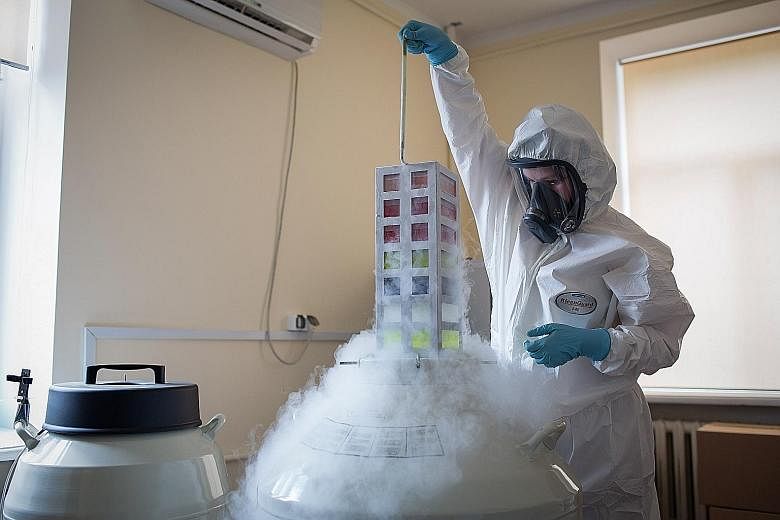GENEVA • The World Health Organisation (WHO) has warned against "vaccine nationalism", saying that vaccine-hogging richer countries would not be safe havens against the coronavirus if poor nations remained exposed.
WHO chief Tedros Adhanom Ghebreyesus said it would be in wealthier nations' interests to ensure that any vaccines eventually produced to protect against the new coronavirus were shared globally.
"Vaccine nationalism is not good, it will not help us," Dr Tedros told the Aspen Security Forum in the United States on Thursday via video-link from the WHO's headquarters in Geneva.
"For the world to recover faster, it has to recover together, because it is a globalised world. The econo-mies are intertwined. Part of the world or a few countries cannot be a safe haven and recover.
"The damage from Covid-19 could be less when those countries who... have the funding commit to this."
He said the existence of the deadly respiratory disease anywhere puts lives and livelihoods at risk everywhere.
"They are not giving charity to others; they are doing it for themselves because when the rest of the world recovers and opens up, they also benefit."
The United Nations health agency also said that multiple different types of vaccines would likely be needed to combat Covid-19. Twenty-six candidate vaccines are in various stages of being tested on humans, with six having reached phase three wider levels of clinical trials.
"Phase three doesn't mean nearly there," explained the WHO's emergencies director Michael Ryan.
"Phase three means this is the first time this vaccine has been put into the general population, into otherwise healthy individuals, to see if the vaccine will protect them against natural infection.
"We have got a good range of products across a number of different platforms, across a number of different countries," he said of the leading candidate vaccines, which use different methods to provide immunity. However, "there is no guarantee that any of these six will give us the answer - and we probably will need more than one vaccine to do this job".
The coronavirus has killed over 715,000 people and infected more than 19 million since the out-break emerged in China last December, according to a tally from official sources compiled by Agence France-Presse.
"The Americas remain the current epicentre of the virus and have been particularly hit hard," said Dr Tedros, with the US, Brazil and Mexico suffering the most deaths.
Asked about the virus raging in the Americas, Dr Ryan said no country had always found all the right answers, and a vast expansion of the public health workforce was required. "We need to take a step back, we need to look at the problem again and we need to go at the problem again," he said. "That requires strong, sustained and trusted leadership."
US President Donald Trump has accused the WHO of being a "puppet" of China and mismanaging its handling of the global pandemic. Washington last month handed in its 12-month notice to leave the WHO, depriving the UN organisation of its biggest donor.
Dr Tedros said the biggest "problem" with the US departure was "not about the money" but the fracture in international solidarity in fighting the coronavirus. "We hope the US will reconsider its position," he said.
The Ethiopian former health minister claimed any problems Washington had with the WHO could be resolved without the US leaving.
"I hope the relationship will return to normal and be a stronger relationship than ever before," he said. "I urge all leaders to choose the path of cooperation... it is the only choice we have."
AGENCE FRANCE-PRESSE











